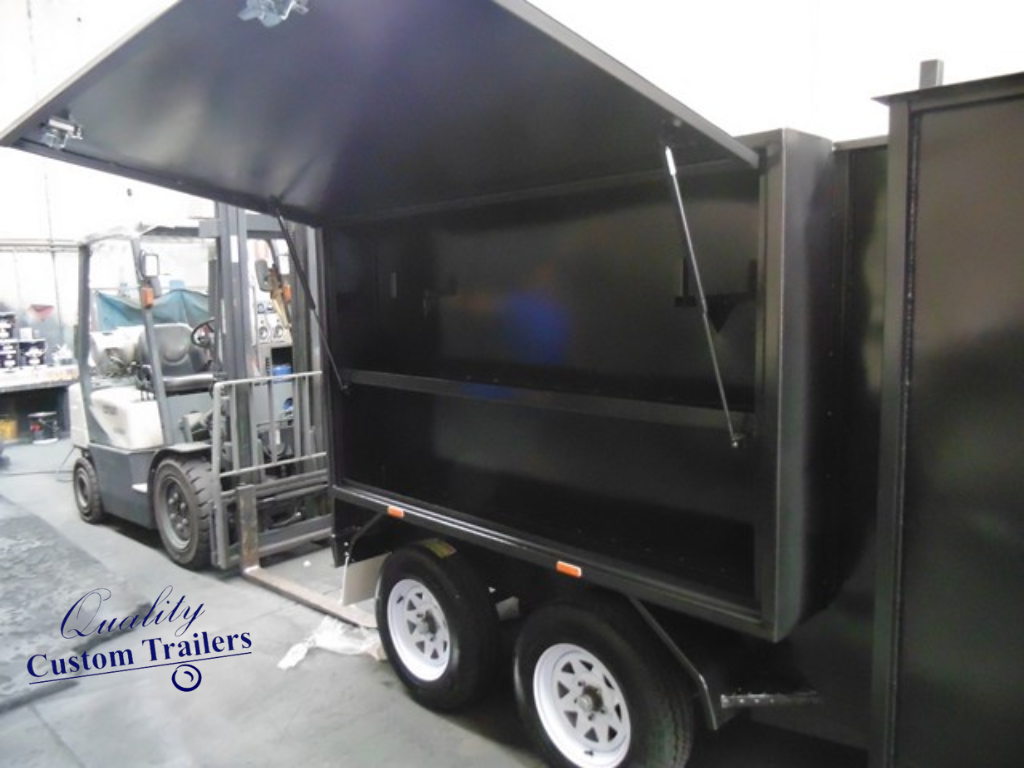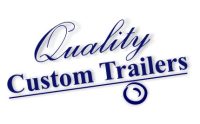Custom food trailers have become a popular choice for entrepreneurs looking to enter the mobile food industry. These trailers offer flexibility, mobility, and the ability to bring unique culinary experiences directly to customers. Unlike traditional brick-and-mortar establishments, custom food trailers can easily move to different locations, participate in events, and reach a broader audience.
Importance of Unique Custom Trailers for Business Success
Creating a unique custom trailer is crucial for standing out in the competitive food industry. A distinctive design not only attracts customers but also reinforces brand identity. Working with skilled trailer builders near me ensures that your trailer meets specific business needs and aesthetic preferences. Custom features, such as eye-catching graphics, specialized equipment, and tailored layouts, can significantly enhance your trailer’s appeal and functionality.
Efficient Kitchen Layout
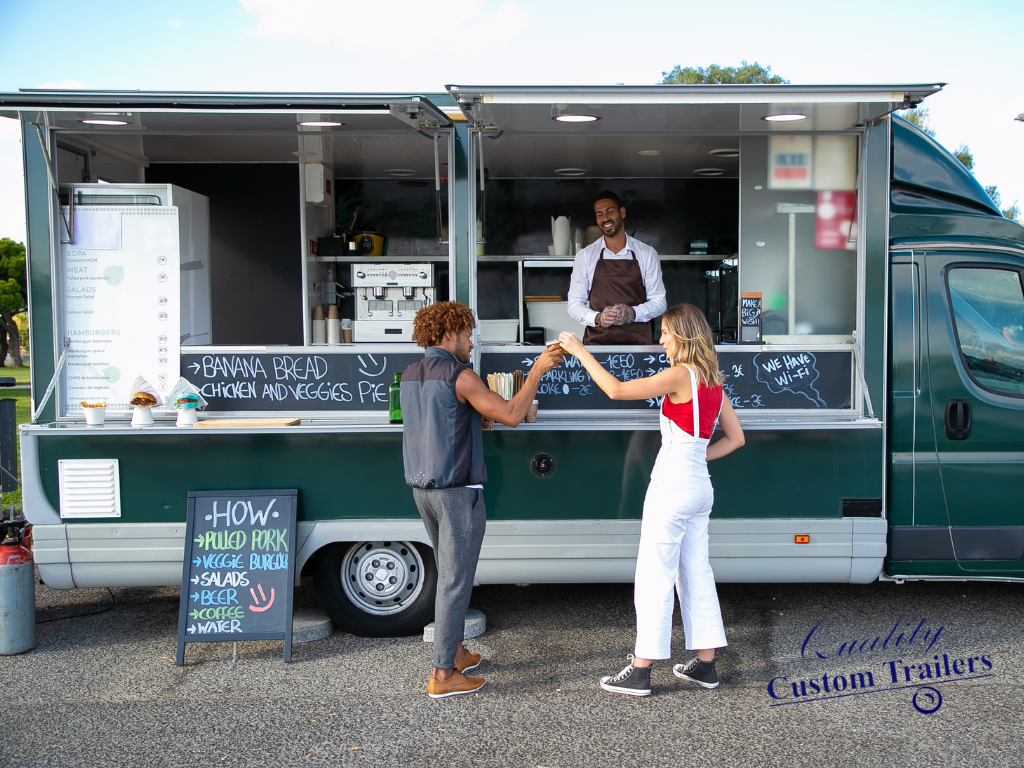
Designing a Functional Kitchen Space
The kitchen layout is a critical aspect of a custom food trailer. An efficiently designed kitchen ensures smooth operations, reduces prep time, and enhances the overall productivity of the staff. Key considerations include:
- Space Allocation: Properly allocating space for cooking, preparation, and serving areas to avoid congestion.
- Workflow Optimization: Arranging appliances and workstations to follow a logical flow, from preparation to cooking to serving.
- Accessibility: Ensuring that all equipment and ingredients are easily accessible to staff.
Optimizing Workflow for Maximum Efficiency
Optimizing workflow is essential for maintaining high service standards, especially during peak hours. Here are some tips to achieve maximum efficiency:
- Zoning: Dividing the kitchen into specific zones for different tasks (e.g., prep area, cooking area, plating area) to minimize movement and cross-contamination.
- Equipment Placement: Positioning frequently used equipment and ingredients within easy reach to save time.
- Clear Signage: Using labels and signs to keep the kitchen organized and help staff quickly locate items.
High-Quality Cooking Equipment
Essential Cooking Appliances for Food Trailers
High-quality cooking equipment is the backbone of any successful custom food trailer. The type of equipment needed depends on the menu, but common essentials include:
- Grills and Griddles: For cooking burgers, steaks, and other grilled items.
- Fryers: Essential for making fried foods like fries, chicken wings, and doughnuts.
- Ovens: Necessary for baking, roasting, and keeping food warm.
- Refrigeration Units: To store perishable ingredients and maintain food safety standards.
Selecting Durable and Reliable Equipment
Durability and reliability are paramount when selecting equipment for a food trailer. Given the mobile nature of the business, equipment must withstand constant movement and varying conditions. Here are some tips for selecting the right equipment:
- Quality Brands: Invest in reputable brands known for their durability and performance.
- Energy Efficiency: Choose energy-efficient appliances to reduce operational costs and environmental impact.
- Warranty and Support: Ensure that equipment comes with a warranty and access to reliable customer support for maintenance and repairs.
Adequate Storage Solutions
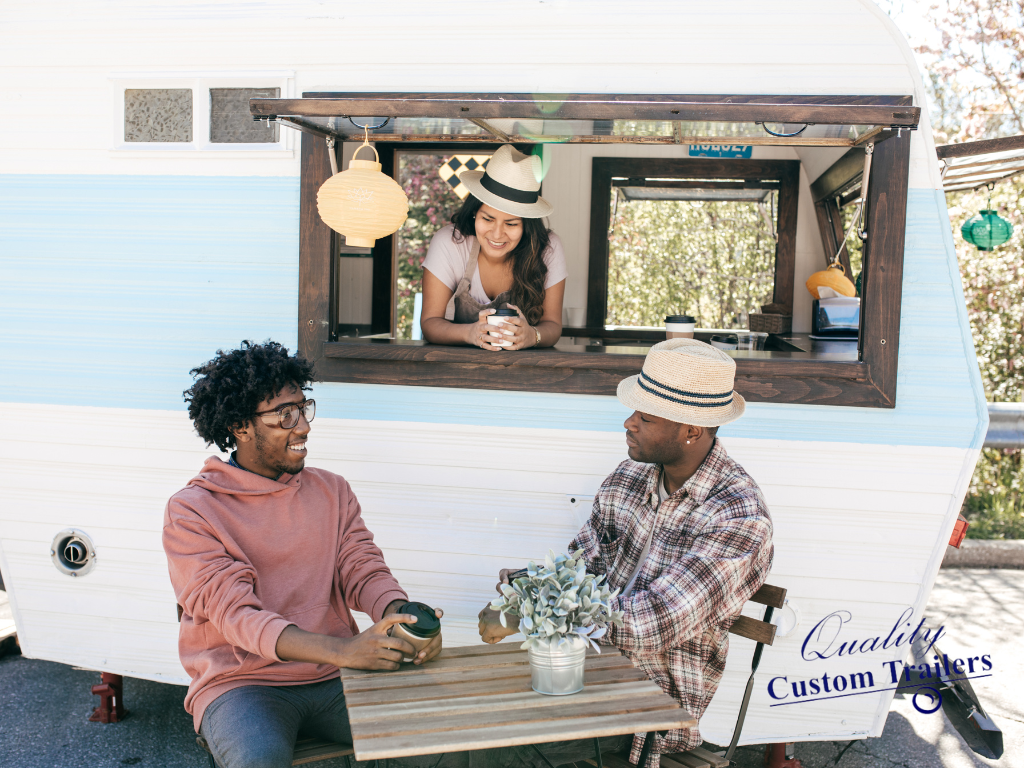
Maximizing Storage Space in Custom Food Trailers
Effective storage solutions are vital for keeping the kitchen organized and ensuring that all necessary supplies are on hand. Space in a custom food trailer is limited, so maximizing storage is essential. Consider the following strategies:
- Vertical Storage: Utilize vertical space by installing shelves and racks to store ingredients, utensils, and equipment.
- Multi-Functional Furniture: Use furniture that doubles as storage, such as benches with built-in compartments.
- Compact Containers: Opt for stackable and compact containers to save space and keep items organized.
Types of Storage Units and Their Benefits
Different types of storage units serve various purposes in a food trailer. Here are some common options and their benefits:
- Shelving Units: Ideal for storing non-perishable items, equipment, and utensils. Adjustable shelves can accommodate items of various sizes.
- Refrigerated Units: Necessary for keeping perishable ingredients fresh. Options include reach-in refrigerators, under-counter units, and refrigerated prep tables.
- Drawer Systems: Perfect for organizing small tools, utensils, and ingredients. Drawers help keep the workspace tidy and efficient.
- Overhead Cabinets: Utilize overhead space to store less frequently used items, freeing up valuable counter and floor space.
Sanitation and Safety Features
Implementing Proper Sanitation Practices
Maintaining high standards of sanitation is crucial in the food industry to ensure the health and safety of customers. Custom food trailers should be equipped with features that facilitate easy cleaning and hygiene maintenance, including:
- Handwashing Stations: Installing sinks with hot and cold running water, soap dispensers, and paper towel holders.
- Sanitizing Surfaces: Using materials that are easy to clean and sanitize, such as stainless steel countertops and non-porous surfaces.
- Waste Management: Providing adequate trash bins and implementing regular waste disposal practices to prevent contamination.
Ensuring Compliance with Health and Safety Regulations
Adhering to health and safety regulations is essential for operating a food trailer. This involves:
- Understanding Local Regulations: Familiarizing yourself with local health codes and requirements for mobile food vendors.
- Regular Inspections: Conducting routine health and safety inspections to ensure compliance and identify potential hazards.
- Training Staff: Providing thorough training for all staff on proper sanitation procedures and safety protocols.
Power and Utility Systems
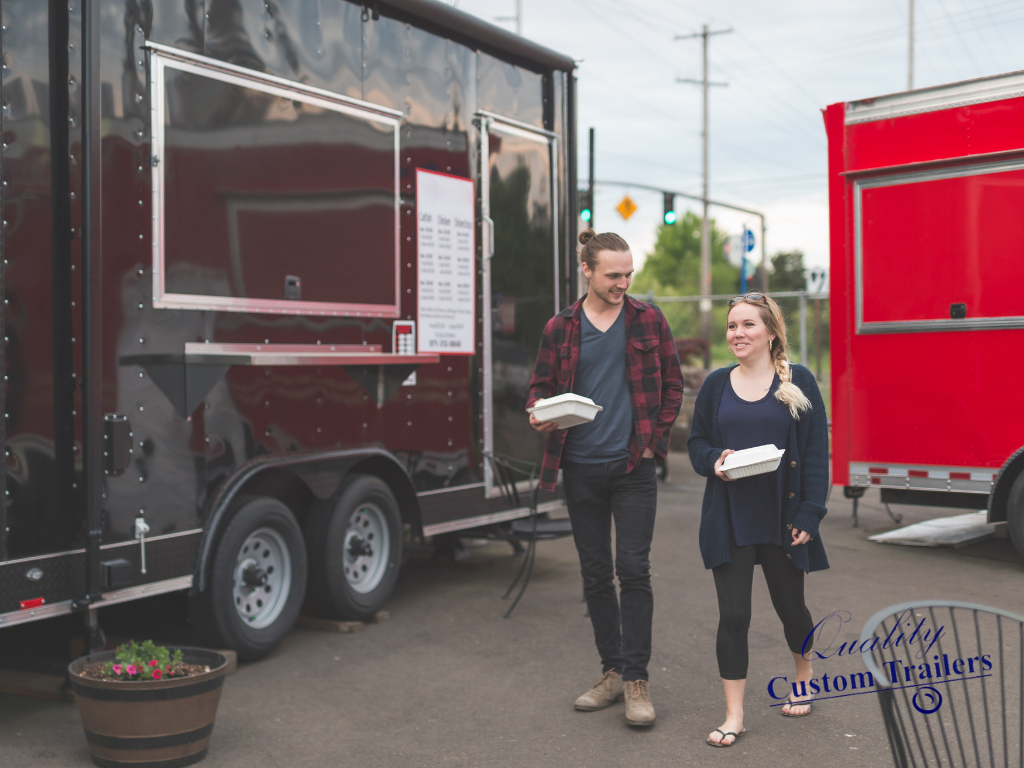
Installing Efficient Power Systems
Reliable power systems are vital for the operation of a custom food trailer. Efficient power solutions include:
- Generators: Investing in a high-quality generator to provide consistent power for all equipment.
- Battery Systems: Using battery packs as backup power sources to ensure continuous operation.
- Energy-Efficient Appliances: Selecting energy-efficient appliances to reduce power consumption and operational costs.
Managing Water and Waste Effectively
Effective water and waste management are crucial for maintaining hygiene and operational efficiency. Key considerations include:
- Water Tanks: Installing fresh water and greywater tanks with sufficient capacity to meet daily needs.
- Water Heaters: Using efficient water heaters to provide hot water for cleaning and cooking.
- Waste Disposal Systems: Implementing systems for the safe disposal of wastewater and solid waste, ensuring compliance with environmental regulations.
Ventilation and Climate Control
Importance of Proper Ventilation
Proper ventilation is essential to maintain a comfortable and safe working environment inside the food trailer. Ventilation systems help to:
- Remove Heat and Smoke: Installing exhaust fans and vents to eliminate heat, smoke, and odors from cooking areas.
- Improve Air Quality: Ensuring a constant flow of fresh air to reduce humidity and prevent mold growth.
Climate Control Solutions for Food Trailers
Maintaining a comfortable temperature inside the food trailer is crucial for both staff and food quality. Climate control solutions include:
- Air Conditioning Units: Installing air conditioning units to keep the interior cool during hot weather.
- Heating Systems: Using portable heaters or built-in heating systems to maintain warmth in colder conditions.
- Insulation: Properly insulating the trailer to improve energy efficiency and temperature control.
Customization and Branding
Designing Unique Custom Trailers for Brand Identity
Creating a unique and visually appealing custom trailer is key to attracting customers and establishing a strong brand identity. Considerations for customization include:
- Exterior Design: Using vibrant colors, graphics, and logos to create an eye-catching exterior that reflects your brand.
- Interior Layout: Designing an interior layout that maximizes efficiency and comfort while aligning with your brand’s aesthetic.
- Signage and Menu Boards: Installing clear and attractive signage and menu boards to enhance customer experience and brand recognition.
Working with Trailer Builders Near Me for Custom Solutions
Collaborating with experienced trailer builders ensures that your custom food trailer meets your specific needs and preferences. Steps to take include:
- Researching Local Builders: Finding reputable trailer builders in your area with positive reviews and a strong portfolio.
- Discussing Your Vision: Clearly communicating your vision and requirements to the builder to ensure the final product aligns with your expectations.
- Reviewing Designs and Prototypes: Reviewing design plans and prototypes to make necessary adjustments before final production.

